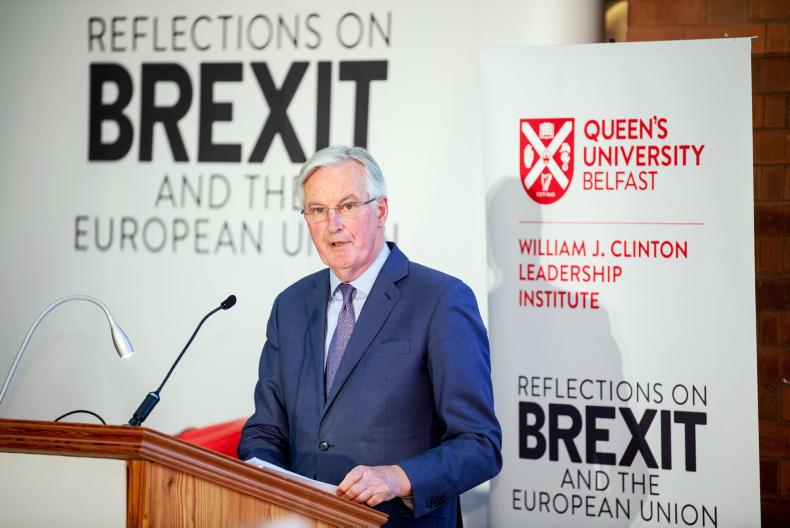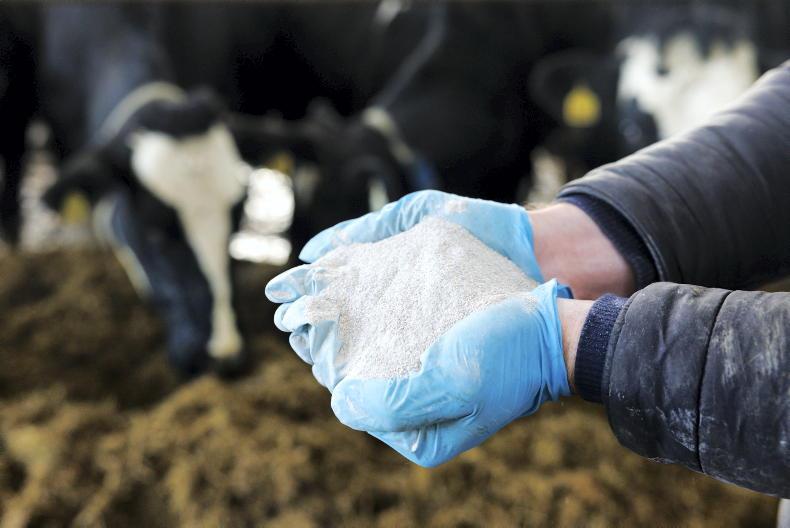The coronavirus is having an impact on virtually every aspect of everyday life across the world, but UK prime minister Boris Johnson says that it won’t change the UK's plans not to extend the transition phase beyond 31 December this year.
A second round of negotiations had been scheduled to take place in London next week, but these have been deferred due to the spread of coronavirus.
EU presents draft
Meanwhile, head of the EU negotiating team Michel Barnier sent a document to the UK on Friday afternoon outlining a possible agreement.
It wasn’t released, but according to The Guardian, which has seen a copy of the proposal, it makes some concessions on fisheries, but the rest of it is very much a stating of EU policy that is unlikely to find favour with the UK.
For Irish farmers, the coronavirus outbreak presents immediate problems in carrying out the everyday tasks of farming that most do on autopilot.
All links of the supply chain have been working together to get livestock delivered to the factory and the milk collected.
Inside the factories, workers have been divided into cells to allow isolation and continuation of business to at least some extent if the virus arrives.
Replacing a perfect egg
However, in some respects, Brexit post-transition presents an even greater risk. The problem here from a trade perspective is that agreeing a future trading relationship between the EU and UK is like trying to rebuild an egg that has been broken.
The EU is a perfect trading environment between members, just like an egg has a perfect shape with a seamless shell.
Once that shell is broken, rebuilding something similar will never achieve the same degree of perfection.
The trouble for farmers whose produce is sold in the UK is that, at the very least, a customs and standards border means inspections.
We await what the UK intentions are on tariffs outside the EU, but if the indication from last year is a starting point, the value of the UK beef market will be decimated.
This will apply equally to Irish and British farmers because an influx of cheap beef will devalue the entire market.
Uncertainty with Irish protocol
Cross-border trade on the island of Ireland is, in theory, sorted with the withdrawal agreement aligning Northern Irish standards aligning with the EU.
However, the UK hasn’t been clear in saying that it will enforce the Irish protocol, despite having agreed it.
If they don’t, then there is little that can be done to make them enforce it, so problems could still arise with cross-border trade.
Farmers, like everyone else, have a problem coping with coronavirus, but there is at least a common bond with the rest of society.
If there isn’t a workable post-Brexit deal agreed, farmers, more than anyone else, will suffer.
Read more
UFU critical of UK tariff plan
20 minutes with Michael Bell, Northern Ireland Food and Drink Association
Hogan outlines the problems for world trade
The coronavirus is having an impact on virtually every aspect of everyday life across the world, but UK prime minister Boris Johnson says that it won’t change the UK's plans not to extend the transition phase beyond 31 December this year.
A second round of negotiations had been scheduled to take place in London next week, but these have been deferred due to the spread of coronavirus.
EU presents draft
Meanwhile, head of the EU negotiating team Michel Barnier sent a document to the UK on Friday afternoon outlining a possible agreement.
It wasn’t released, but according to The Guardian, which has seen a copy of the proposal, it makes some concessions on fisheries, but the rest of it is very much a stating of EU policy that is unlikely to find favour with the UK.
For Irish farmers, the coronavirus outbreak presents immediate problems in carrying out the everyday tasks of farming that most do on autopilot.
All links of the supply chain have been working together to get livestock delivered to the factory and the milk collected.
Inside the factories, workers have been divided into cells to allow isolation and continuation of business to at least some extent if the virus arrives.
Replacing a perfect egg
However, in some respects, Brexit post-transition presents an even greater risk. The problem here from a trade perspective is that agreeing a future trading relationship between the EU and UK is like trying to rebuild an egg that has been broken.
The EU is a perfect trading environment between members, just like an egg has a perfect shape with a seamless shell.
Once that shell is broken, rebuilding something similar will never achieve the same degree of perfection.
The trouble for farmers whose produce is sold in the UK is that, at the very least, a customs and standards border means inspections.
We await what the UK intentions are on tariffs outside the EU, but if the indication from last year is a starting point, the value of the UK beef market will be decimated.
This will apply equally to Irish and British farmers because an influx of cheap beef will devalue the entire market.
Uncertainty with Irish protocol
Cross-border trade on the island of Ireland is, in theory, sorted with the withdrawal agreement aligning Northern Irish standards aligning with the EU.
However, the UK hasn’t been clear in saying that it will enforce the Irish protocol, despite having agreed it.
If they don’t, then there is little that can be done to make them enforce it, so problems could still arise with cross-border trade.
Farmers, like everyone else, have a problem coping with coronavirus, but there is at least a common bond with the rest of society.
If there isn’t a workable post-Brexit deal agreed, farmers, more than anyone else, will suffer.
Read more
UFU critical of UK tariff plan
20 minutes with Michael Bell, Northern Ireland Food and Drink Association
Hogan outlines the problems for world trade










SHARING OPTIONS